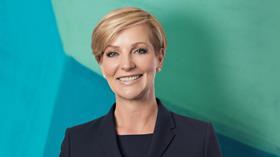
Christiane, BayWa and its fresh produce subsidiaries appear to be working much closer now than they have in the past. Is that a fair assessment?
Christiane Bell: From our point of view, this is a major change and one that is overdue. The way we present ourselves documents the journey that BayWa had since 2012 when it acquired its shareholding in T&G. We need to keep doing that in our daily business. We want to let everyone know that, as of now, things are different.
What progress has the group made?
CB: Everything is being questioned. We’ve had major changes in management at T&G and been really fortunate to find the right people at the right time, like Gareth [Edgecombe, CEO] and Peter [Landon-Lane, COO]. With them we are restructuring not only T&G but also the way we operate. To give you another example, in Dubai we’re in the process of rebuilding TFC Middle East, which soon will be BayWa’s Global Produce Middle East office and present one face to the customer.
Is that the goal in Europe too?
CB: For sure, we are looking to cut down a significant amount of redundancies. We are here to maximise grower income, so everything is on the table and there is no time to waste. We’re basically looking at four areas. Productivity and profitability at all levels. Excellence and competence, where we need to upgrade the knowledge that we have. Unity and synergy is third, which is reflected in our corporate footprint, and last but not least is obviously sustainability.
In Germany, BayWa Global Produce is climate-neutral right now. Next step is TFC, after that T&G. But being emission-free isn’t the end of the story. We need to cut back resource inputs, food miles, packaging, plastic, water consumption, everything, and maximise productivity and make it visible to all.
What can be done to improve competence?
CB: Look at our grapes in Peru. If you want to make a success of marketing high-quality grapes, then you need to have someone there doing that job perfectly. A long-distance growing structure does not work. You have to be on the ground and be committed to growing.
In the Middle East, your joint venture greenhouse project with Al Dahra recently entered full production and now supplies snack tomatoes to lots of retail customers. Do you plan to work with Al Dahra on other projects in other parts of the world?
CB: There is certainly a win-win situation there and we have very good and constructive conversations with Al Dahra. For instance, we’re looking at trying to support our Serbian and Romania operation with technical equipment. You basically have two very attractive companies that can collaborate on a large scale. Al Dahra has a profile that matches beautifully with ours.



